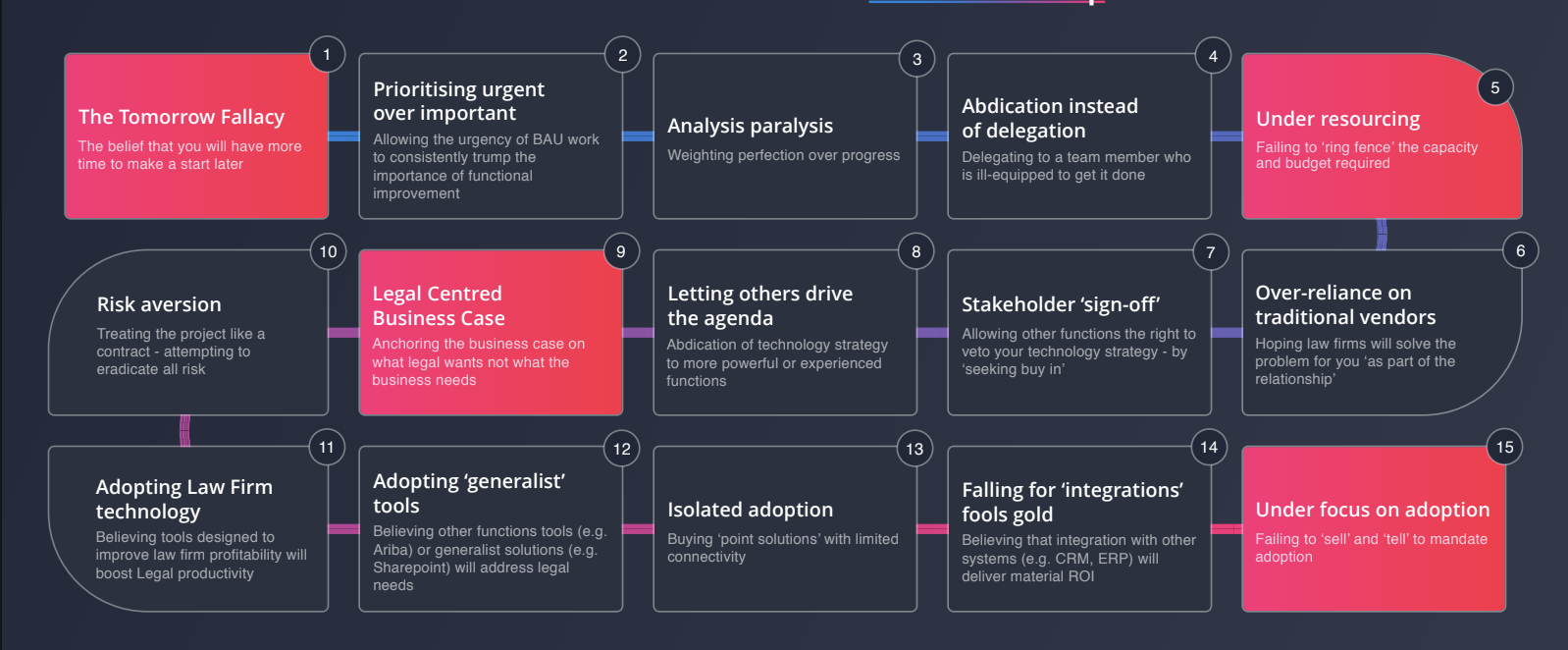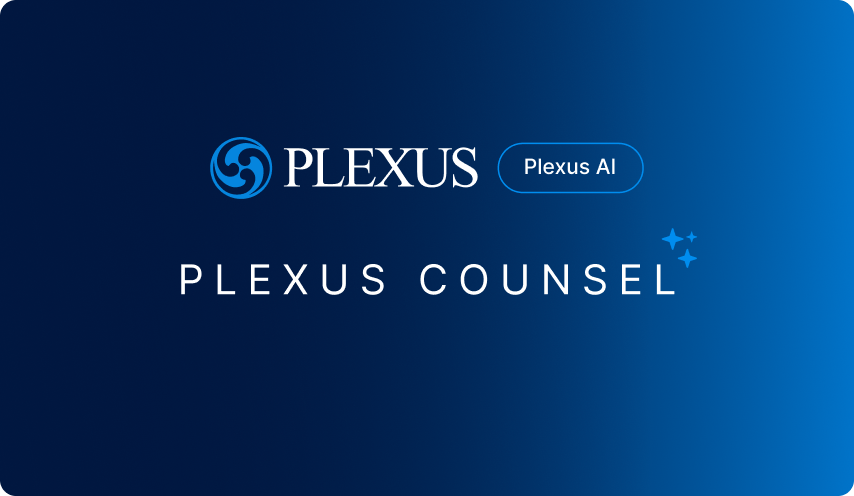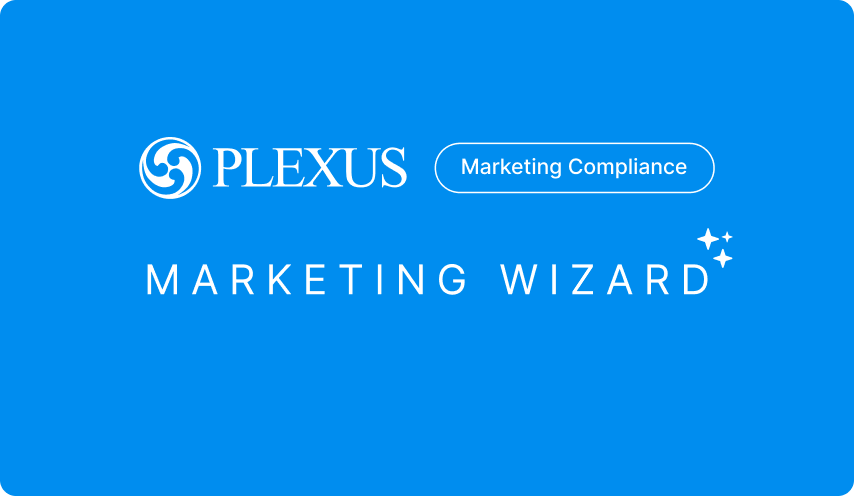Enterprise tech adoption in legal: what GCs need to know
In today’s business landscape, enterprise tech adoption is no longer driven by CIOs and CTOs. General Counsels are stepping into a more transformative role , shaping how legal technology supports faster risk mitigation, smarter contract velocity, and scaling legal support.
.png)
Alicia Kearns
March 29, 2025 • 4-minute read

or
GCs are no longer just stewards of compliance , they’re being asked to lead digital transformation inside one of the most complex and risk-sensitive functions in the business.
Why legal tech strategy matters more than ever
Across industries, legal functions are under pressure to keep up with the broader digital transformation agenda. Many teams have responded by implementing a variety of individual tools - intake systems, eSignature platforms, and contract repositories - to address immediate challenges.
But without a cohesive, long-term tech strategy, these solutions can quickly lead to complexity, low adoption, and limited impact. It’s not about thinking bigger for the sake of it , it’s about ensuring technology choices are sustainable, scalable, and aligned to how legal teams work and deliver value.
Here are five common pitfalls GCs should be aware of and why taking a more strategic, long-term approach to legal tech is essential to meet today’s enterprise expectations.
1. Integration gets harder over time
Quick-fix tools rarely integrate well down the line. Each one creates a silo , fracturing data and creating more work for already stretched teams. As new tools are layered into the ecosystem, interoperability becomes more complex and costly, often requiring manual workarounds or expensive integrations.
2. Poor user adoption undermines ROI
If tools don’t fit legal’s actual workflows - or demand too much behavioural change - usage drops. Legal teams revert to email, spreadsheets, or manual processes. As a result, tech investments fail to deliver their intended impact.
3. Mounting costs and shallow value
Budget-friendly tools can appear attractive, but their limitations often surface quickly. As requirements evolve, teams are forced to buy additional tools or upgrade to more complex systems, creating redundancy and budget overruns.
4. Scalability is non-negotiable
Legal teams are not static. They grow with the business adding headcount, expanding into new geographies, or increasing service expectations. Solutions that can’t scale quickly become barriers to growth and agility.
5. Isolated data = missed opportunities
Legal teams now have access to performance data that can influence business decisions. But when tools don’t talk to each other, the full picture is lost. Disconnected systems prevent meaningful reporting, strategic forecasting, and data-driven decision-making.

Enterprise tech expectations have changed
1. Legal is expected to modernise, fast
Across the enterprise, every function is digitising. Legal must keep pace.
General Counsels are being asked to lead adoption of technologies that deliver:
-
Contract standardisation and automation
-
Data-driven compliance tracking
-
Scalable, AI-powered risk reviews
-
Workflow integration across sales, finance, and procurement
With Plexus: Legal matches enterprise speed without overextending capacity or compromising control.
2. AI is accelerating but must be operationalised
Enterprise AI is evolving rapidly but in Legal, real value only comes when AI is embedded into daily workflows.
With Plexus: AI isn’t theoretical. It works where lawyers work , flagging clause deviations, auto-routing approvals, and enabling triage with real-time legal oversight.
3. Integration is expected but complexity must be managed
Legal must connect with systems like Salesforce, SAP, and Workday. But integration can’t be a barrier to progress.
With Plexus: You start with impact, then layer in interoperability. Each module delivers standalone value while aligning with enterprise architecture.
4. Adoption is the real differentiator
Legal tech isn’t new. What separates successful teams is not what they buy, it’s what they use. Plexus' Transformation Doom Loop details some of the fail points that we see across enterprise adoption.

With Plexus: We build for adoption from day one, designing intuitive, workflow-aligned experiences that legal teams actually use and rely on.
5. Enterprise expectations are rising
In a post-digital business, Legal is expected to deliver ROI, operate with speed, and reduce manual work just like any other high-functioning department.
With Plexus: Legal teams demonstrate measurable value in weeks: faster deal velocity, greater business self-service, and less low-value admin.
Tech adoption is not optional, it’s strategic
This shift isn’t just about technology, it’s about operating like a modern function. That means aligning with enterprise expectations, adopting fit-for-purpose tools, and building a legal function that delivers more, with less.
Plexus exists to make that shift achievable. We help General Counsels embed technology that drives adoption, reduces risk, and delivers operational ROI without slowing down the business.
.png)
Alicia Kearns
Alicia Kearns is the Chief Marketing Officer at Plexus, bringing over two decades of global marketing leadership across top brands, including LinkedIn, SAP, IBM, and Macquarie. An expert in go-to-market, brand, demand, and content strategy, she helps fast-growth tech scale-ups accelerate awareness and reach their potential.
All your legal work in one AI-powered platform.
Faster reviews, self-service for business teams, and smarter compliance in every workflow.
Related resources
Stay informed with legal ops insights
Monthly legal ops news, straight to your inbox.









